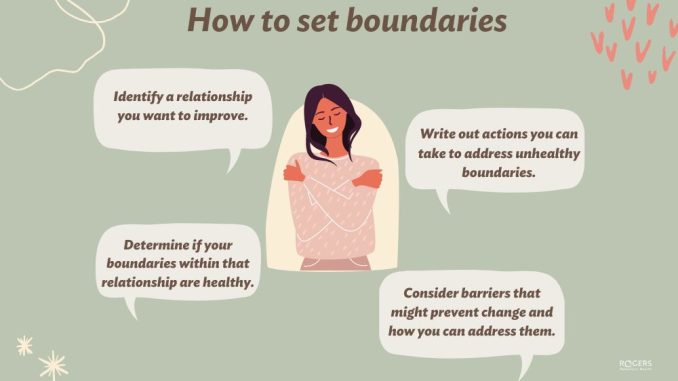
In today’s fast-paced and hyper-connected world, protecting your mental wellness is more important than ever. One of the most effective ways to maintain mental health is by setting clear, healthy boundaries. Boundaries help define where your needs, emotions, and responsibilities begin and end, allowing you to protect your time, energy, and emotional well-being.
However, setting boundaries can be challenging, especially if you’re used to people-pleasing or putting others’ needs before your own. This article explores why boundaries are essential for mental wellness and offers practical tips to help you establish and maintain them confidently and respectfully.
Why Boundaries Matter for Mental Wellness
Boundaries act as invisible lines that protect your emotional space and energy. When boundaries are unclear or ignored, it can lead to feelings of overwhelm, resentment, stress, and even burnout. Healthy boundaries enable you to:
-
Manage stress by reducing emotional overload
-
Enhance self-esteem through self-respect and self-care
-
Improve relationships by creating mutual understanding and respect
-
Prevent burnout by balancing your needs with others’ expectations
-
Gain a sense of control over your life and choices
Setting boundaries is not about pushing others away or being selfish; it’s about honoring your limits so you can show up as your best self, emotionally and mentally.
Common Types of Boundaries
Before diving into tips, it’s helpful to understand the different types of boundaries:
-
Physical boundaries: Personal space, touch, privacy
-
Emotional boundaries: Protecting your feelings, saying no to emotional demands
-
Time boundaries: Managing your availability and commitments
-
Digital boundaries: Setting limits on technology use and online engagement
-
Material boundaries: Protecting your possessions and resources
Each type plays a role in maintaining mental wellness and requires different approaches.
Tips for Setting Boundaries for Mental Wellness
1. Identify Your Limits and Needs
Start by reflecting on what makes you feel drained, uncomfortable, or stressed. Pay attention to moments when you feel overwhelmed, anxious, or resentful. These feelings often signal where boundaries need strengthening. Understanding your limits is the foundation for setting clear boundaries.
2. Communicate Clearly and Assertively
Once you know your limits, communicate them honestly and respectfully. Use “I” statements to express your needs without blaming others. For example, “I need time to recharge after work, so I won’t be available for calls in the evening.” Clear communication helps prevent misunderstandings and sets expectations.
3. Learn to Say No Without Guilt
Saying no can be difficult, especially if you fear disappointing others. Remember that “no” is a complete sentence. You don’t owe elaborate explanations or justifications. Saying no when something doesn’t serve your mental health is an act of self-care and empowerment.
4. Set Boundaries Early and Consistently
Establish boundaries as soon as possible, especially in new relationships or situations. Consistency reinforces your limits and helps others respect them. If you waiver or give in repeatedly, it can create confusion and undermine your efforts.
5. Use Technology Wisely
Digital boundaries are crucial in an era of constant connectivity. Set specific times to check emails or social media, and turn off notifications during rest or family time. Consider designating “tech-free” zones or periods to maintain mental balance.
6. Prioritize Self-Care
Self-care practices reinforce boundaries by emphasizing your worth and well-being. Regularly engage in activities that recharge you physically, emotionally, and mentally. When you prioritize self-care, setting and maintaining boundaries becomes easier and more natural.
7. Practice Mindfulness and Self-Awareness
Stay tuned to your feelings and reactions. Mindfulness helps you recognize when your boundaries are being tested or crossed. The sooner you notice, the quicker you can address the situation before stress or resentment builds up.
8. Prepare for Pushback
Not everyone will immediately respect your boundaries. Some may resist or test them, especially if they are used to you being more accommodating. Be patient but firm, and remember that your mental health takes precedence. Reiterate your boundaries calmly when necessary.
9. Seek Support When Needed
Setting boundaries can feel lonely or intimidating, especially if you’re not used to it. Reach out to trusted friends, family, or a mental health professional for guidance and encouragement. Support can boost your confidence and provide perspective.
10. Reassess and Adjust Boundaries Over Time
Your needs and circumstances change, so boundaries should be flexible too. Regularly check in with yourself to ensure your boundaries still align with your mental wellness goals. Adjust as needed to maintain balance and protection.
The Impact of Healthy Boundaries on Mental Wellness
Establishing boundaries can significantly improve your emotional state. When you protect your time and energy, you reduce stress and increase feelings of safety and self-respect. Boundaries also improve communication and deepen relationships because they foster honesty and mutual understanding.
People with strong boundaries tend to experience less anxiety, depression, and burnout. They also report higher satisfaction with their personal and professional lives. In short, boundaries are a cornerstone of mental wellness and overall quality of life.
Conclusion
Setting boundaries is a vital skill for maintaining mental wellness in an increasingly demanding world. It’s about honoring your limits, communicating clearly, and protecting your emotional health. While it can feel challenging at first, practicing these tips will help you build resilience, reduce stress, and cultivate healthier relationships.
Remember, boundaries are not barriers—they are bridges to better self-care and emotional well-being. By taking charge of your limits, you empower yourself to live a more balanced and fulfilling life.